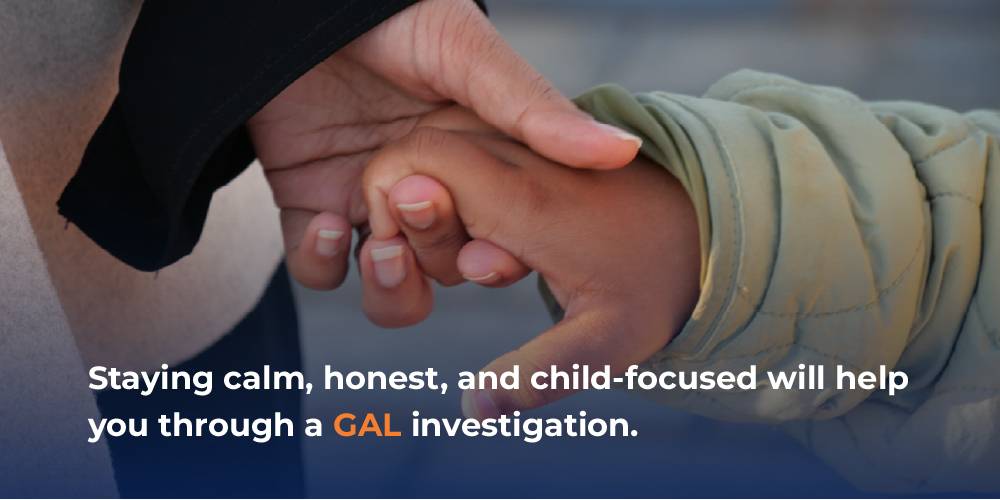Free Initial Consultations
 630-580-6373
630-580-6373With offices in Naperville, Joliet, Wheaton, Plainfield & Chicago
 Learning that a guardian ad litem (GAL) has been appointed in your case can feel overwhelming. It is common for parents to worry that a court bringing in the help of a GAL means they are doing something wrong. It is natural to feel nervous when it seems like every decision is under scrutiny. However, a GAL is not there to criticize your parenting or to take your kids away from you. Their role is to look closely at your children’s lives and make recommendations to a judge about what is in each child’s best interest in a child custody or divorce case.
Learning that a guardian ad litem (GAL) has been appointed in your case can feel overwhelming. It is common for parents to worry that a court bringing in the help of a GAL means they are doing something wrong. It is natural to feel nervous when it seems like every decision is under scrutiny. However, a GAL is not there to criticize your parenting or to take your kids away from you. Their role is to look closely at your children’s lives and make recommendations to a judge about what is in each child’s best interest in a child custody or divorce case.
You will have questions throughout the process. For answers, work with an experienced DuPage County, IL family law attorney who understands GAL investigations and can guide you through every stage of the process.
Under 750 ILCS 5/506, a court may appoint a GAL to interview, investigate, and make recommendations to the judge. The GAL represents the child’s interests, not either parent’s. Ultimately, Illinois courts must base custody decisions on what serves the child’s best interests, and a GAL is there to support that standard. They assess and discuss the child’s safety, emotional needs, and the ability of each parent to provide a stable home.
A GAL will typically meet with both parents, visit each home, and interview the child. They may also speak with teachers, counselors, or relatives who know the child well. All of this information helps the court gain a fuller picture of what daily life looks like for the child.
Once appointed, the GAL will begin their investigation, which often includes home visits. A GAL home visit is generally brief and focused. The GAL wants to see your child in their usual surroundings and will pay attention to several things, including:
The overall condition of your home, including cleanliness, safety, and suitability for children
How your child interacts with you and whether they appear happy, relaxed, and well cared for in their daily environment
Signs that routines are stable and that your child’s basic needs, such as food and sleep, are being met
Any potential risks inside or around the home, including unsafe items, animals, or individuals who may pose a danger
The atmosphere of the household and whether it feels supportive, calm, and suitable for a child’s development
You will usually receive notice of the visit in advance. If there are concerns about abuse or neglect, however, the court can allow an unannounced visit. Courts follow 750 ILCS 5/602.7, which outlines parenting time and decision-making factors, to evaluate whether each home environment supports the child’s stability and well-being.
The GAL’s responsibility is to the child. They are expected to stay fair, pay attention, and suggest what is best for the child. In practice, that means they should be professional and direct. Expect them to be clear about what information they need from you.
Even if you disagree with the GAL’s conclusions, it serves you to be cooperative and respectful. Showing that you can stay calm and child-focused demonstrates maturity. That will help your credibility with the court.
Bias should not occur, but GALs are human and can make mistakes. If you believe the GAL is being unfair, discuss your concerns with your attorney right away. Provide clear examples. Are they making inaccurate statements? Did they fail to visit your home? Is there evidence that only considers your co-parent’s version of events?
Do not confront the GAL directly or accuse them without proof. You can take your concerns to the judge. The court will take documented, reasonable complaints seriously. Your lawyer can help you file a motion or raise the concern appropriately.
Facing a guardian ad litem investigation can be intimidating. Keeping these steps in mind will help you stay prepared and focused on what truly matters, which is your child’s well-being.
Panic will only add to your stress. Take time to learn about the process and focus on preparation. Work with your attorney to gather relevant information, such as school schedules, medical records, and examples of your parenting involvement. If possible, take a parenting class to show the court that you are proactive and committed to your child’s well-being.
The court wants to see that both parents are putting the child’s well-being above personal conflict. Judges pay close attention to how each parent communicates, handles disagreements, and supports the child’s emotional and physical needs. Showing patience, cooperation, and consistency helps the court see that you are focused on providing your child a stable and positive environment.
Courts value parents who are open and truthful during a GAL investigation. Providing accurate information helps the GAL understand each parent’s situation and make fair recommendations. If there are past challenges or sensitive issues, addressing them honestly and showing how they have been resolved demonstrates accountability and stability.
There is no need to make major changes to your home. The GAL’s main goal is to confirm that the living environment is safe and comfortable for the child. A clean, organized space helps show the court that the home is stable and well-maintained. Examples include having food available, a proper place for the child to sleep, and safely stored medications or cleaning products.
The court expects parents to keep children informed in an age-appropriate way without adding unnecessary stress. It is helpful to explain that someone will be talking to them about their home and daily life. Keep the conversation calm and simple so the child feels comfortable. Avoid sharing too many details or trying to influence what the child says, as this can create confusion or pressure.
Even well-intentioned parents can make small errors that affect how they are perceived. Parents sometimes make errors that can hurt their credibility during a GAL investigation. Some simple mistakes to avoid include:
Speaking negatively about the other parent in front of your child or the GAL
Refusing to cooperate or canceling scheduled visits
Coaching your child on what to say
Posting angry or inappropriate content on social media
Exaggerating or hiding facts that can be easily verified
After completing their investigation, the GAL submits a written report to the court. This report may include summaries of interviews, home visits, and professional opinions about parenting time, decision-making, or restrictions.
Judges give strong weight to GAL recommendations, but they are not required to follow them. Your attorney can review the report and address any errors. They help you respond before final decisions are made. If needed, they can also request to cross-examine the GAL in court. This allows you to question the GAL’s findings directly, helping the court evaluate how the conclusions were reached and whether they are supported by the evidence.

When a guardian ad litem becomes involved in a custody case, experienced legal support is essential. The attorneys at Davi Law Group understand how emotional and complex these matters can be. Our founding attorney, Dion U. Davi, draws on his background as an Assistant State’s Attorney in DuPage County, giving him a valuable perspective on how local courts approach family law disputes. As a team, we believe that effective negotiation is one of the most powerful tools in resolving sensitive legal issues. We focus on achieving strong, fair results through practical solutions that save clients time, stress, and expense whenever possible.
To learn more about child representation and how we can help you, call 630-657-5052 to schedule a free consultation with our DuPage County, IL family lawyers today.
